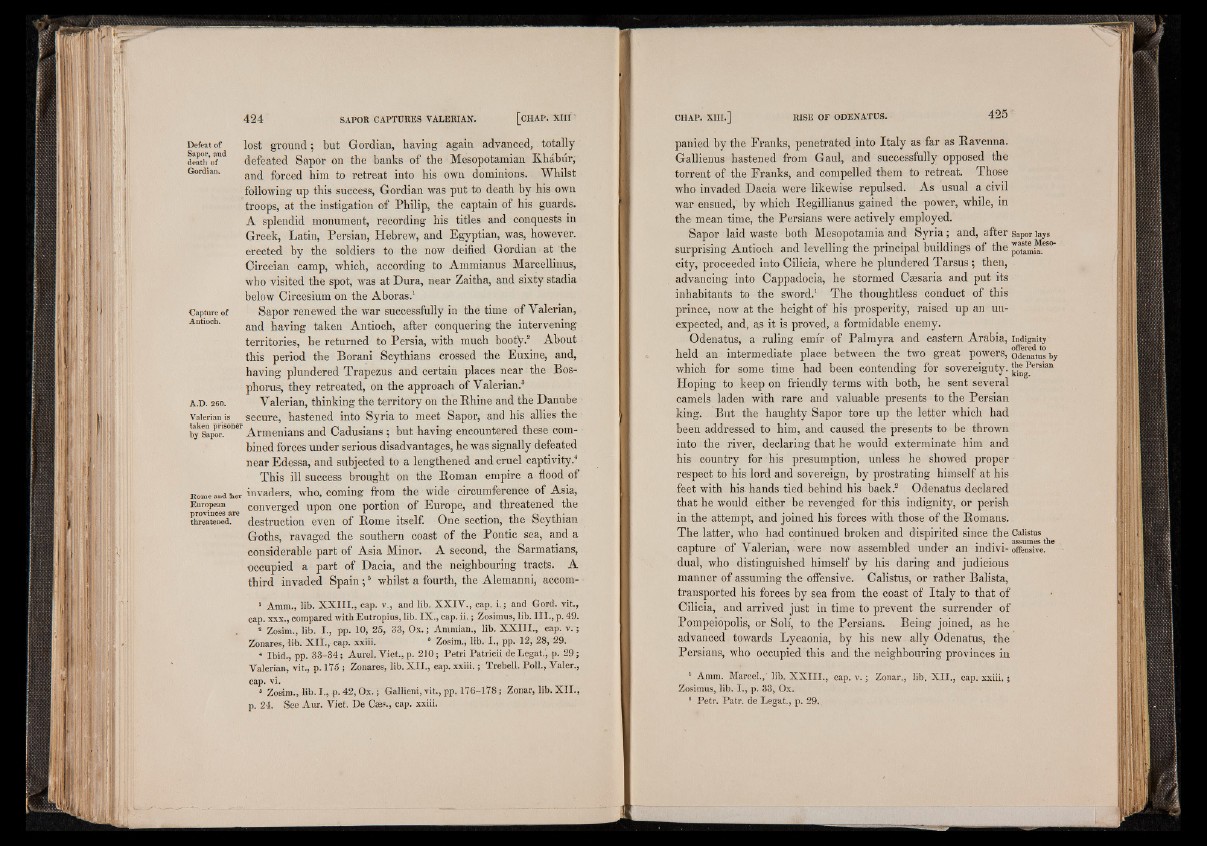
Defeat of
Sapor, and
death of
Gordian,
Capture of
Antioch.
lost ground; but Gordian, having again advanced, totally
defeated Sapor on the banks of the Mesopotamian Khabur,
and forced him to retreat into his own dominions. Whilst
following up this success, Gordian was put to death by his own
troops, at the instigation of Philip, the captain of his guards.
A splendid monument, recording his titles and conquests in
Greek, Latin, Persian, Hebrew, and Egyptian, was, however,
erected by the soldiers to the now deified Gordian at the
Girceian camp, which, according to Ammianus Marcellinus,
who visited the spot, was at Dura, near Zaitha, and sixty stadia
below Circesium on the Aboras.1
Sapor renewed the war successfully in the time of Valerian,
and having taken Antioch, after conquering the intervening
territories, he returned to Persia, with much booty.2 About
this period the Borani Scythians crossed the Euxine, and,
having plundered Trapezus and certain places near the Bosphorus,
A.D. 260,
Valerian is
taken prisoner
by Sapor.
Rome and her
European
provinces are
threatened.
they retreated, on the approach of Valerian.3
Valerian, thinking the territory on the Rhine and the Danube
secure, hastened into Syria to meet Sapor, and his allies the
Armenians and Cadusians ; but having encountered these combined
forces under serious disadvantages, he was signally defeated
nearEdessa, and subjected to a lengthened and cruel captivity.4
This ill success brought on the Roman empire a flood of
invaders, who, coming from the wide circumference of Asia,
converged upon one portion of Europe, and threatened the
destruction even of Rome itself. One section, the Scythian
Goths, ravaged the southern coast of the Pontic sea, and a
considerable part of Asia Minor. A second, the Sarmatians,
occupied a part of Dacia, and the neighbouring tracts. A
third invaded Spain;6 whilst a fourth, the Alemanni, accom-
1 Amm., lib. X X I I I ., cap. v., and Kb. X X IV ., cap. i . ; and Gord. vit.,
cap. xxx., compared with Eutropius, lib. IX ., Cap. i i . ; Zosimus, lib. I I I ., p. 49.
8 Zosim., lib. I., pp. 10, 25, 33, O x .; Ammian., lib. X X I I I ., cap. v . ;
Zonares, 'lib. X I I ., cap. xxiii. 8 Zosim., lib. I ., pp. 12, 28, 29.
4 Ibid., pp. 33-3 4 ; Aurel. Viet., p. 210; Petri Patricii deLegat.', p. 29 ;
Valerian, vit., p. 175 ; Zonares, lib. X I I ., cap. x x iii.; Trebell. Poll., Valer.,
cap. vi.
5 Z o s im . , lib. I ., p. 42, O x .; Gallieni, vit., pp. 176-178 ; Zonar, lib. X I I .,
p. 24. See Aur. Viet. De Cses., cap. xxiii.
panied by the Franks, penetrated into Italy as far as Ravenna.
Gallienus hastened from Gaul, and successfully opposed the
torrent of the Franks, and compelled them to retreat. Those
who invaded Dacia were likewise repulsed. As usual a civil
war ensued, by which Regillianus gained the power, while, in
the mean time, the Persians were actively employed.
Sapor laid waste both Mesopotamia and Syria; and, after sapor lays
surprising Antioch and levelling the principal buildings of the
city, proceeded into Cilicia, where he plundered Tarsus; then,
advancing into Cappadocia, he stormed Csesaria and put its
inhabitants to the sword.1 The thoughtless conduct of this
prince, now at the height of his prosperity, raised up an unexpected,
and, as it is proved, a formidable enemy.
Odenatus, a ruling emir of Palmyra and eastern Arabia, indignity
held an. intermediate place between the two great powers, odenatus by
which for some time had been contending for sovereignty. [1)]gPerslan
Hoping to keep on friendly terms with both, he sent several
camels laden with rare and valuable presents to the Persian
king. But the haughty Sapor tore up the letter which had
been addressed to him, and caused the presents to be thrown
into the river, declaring that he would exterminate him and
his country for his presumption, unless he showed proper
respect to his lord and sovereign, by prostrating himself at his
feet with his hands tied behind his back.2 Odenatus declared
that he would either be revenged for this indignity, or perish
in the attempt, and joined his forces with those of the Romans.
The latter, who had continued broken and dispirited since the Caiistus
n TT- , . i l l i i • • assumes the capture ot V alerian, were now assembled under an indivi- offensive,
dual, who distinguished himself by his daring and judicious
manner of assuming the offensive. Caiistus, or rather Balista,
transported his forces by sea from the coast of Italy to that of
Cilicia, and arrived just in time to prevent the surrender of
Pompeiopolis, or Soli, to the Persians. Being joined, as he
advanced towards Lycaonia, by his new ally Odenatus, the
Persians, who occupied this and the neighbouring provinces in
’ Amm. Marcel.,- lib. X X I I I ., cap. v . ; Zonar., lib. X I I ., cap. x x iii.;
Zosimus, lib. I., p. 33, Ox.
8 Petr. Patr. de Legat., p. 29.